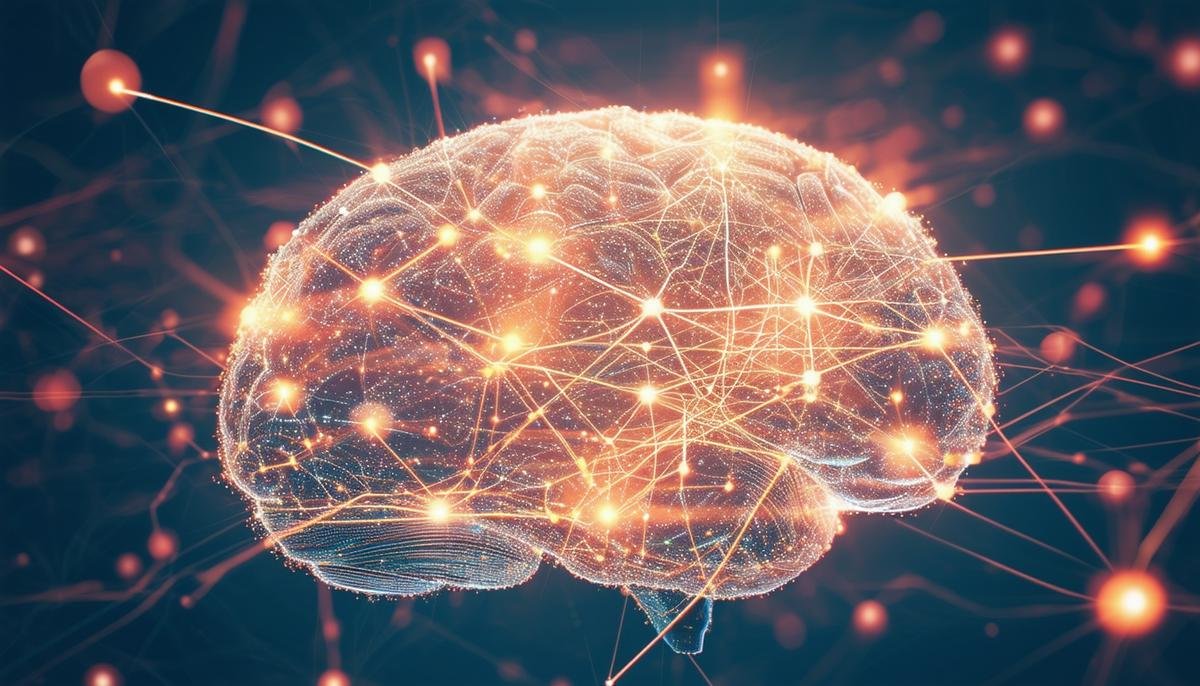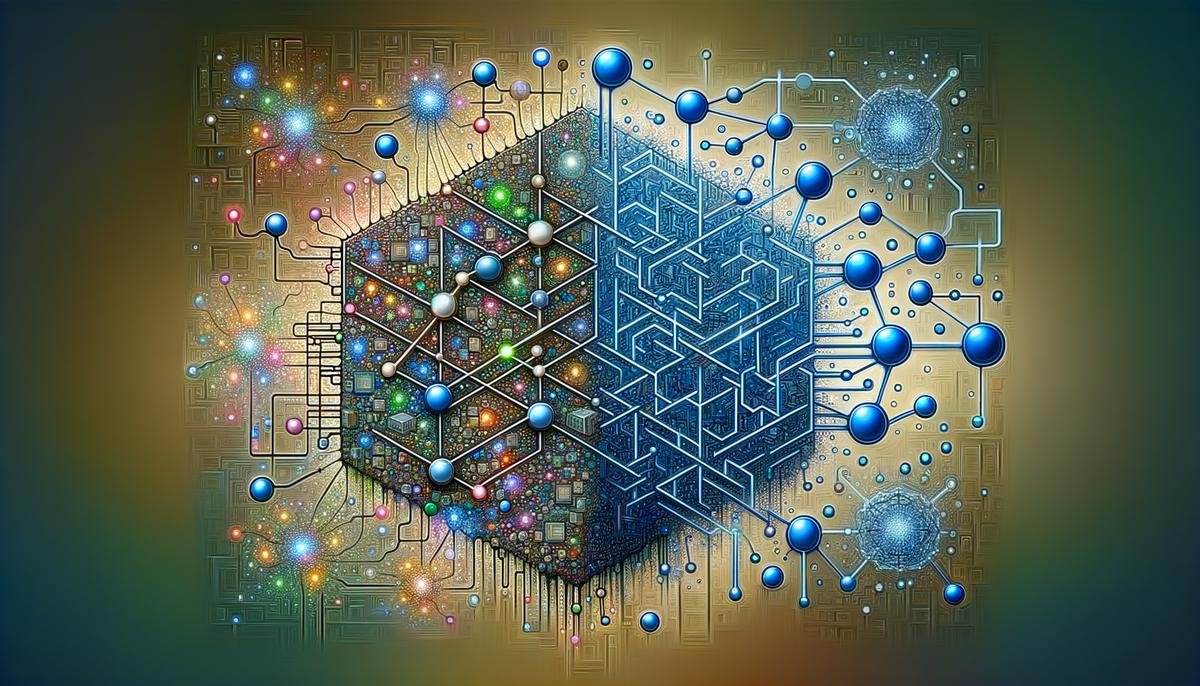Social media platforms face numerous challenges today, from the rapid spread of misinformation to privacy concerns and echo chambers. These issues not only affect user experience but also have broader societal implications. The integration of Artificial General Intelligence (AGI) and Blockchain-based General Intelligence (BGI) offers promising solutions to address these challenges, potentially transforming how we interact online.
Current Challenges in Social Media
Social media today faces various challenges. Misinformation spreads rapidly, polarizing opinions and reinforcing preexisting notions through echo chambers. Privacy concerns are prevalent, with centralized platforms controlling user data and being vulnerable to breaches.
AGI and BGI propose solutions to these issues. AGI can learn and adapt across various fields, while integrating it with blockchain technology can create secure, transparent, and decentralized platforms. Blockchain’s transparency ensures no single entity holds uncontrolled power over personal data.
Content moderation would benefit from AGI/BGI, with advanced algorithms automatically filtering harmful or misleading content. This would foster a safer environment for users to share and interact.
Blockchain technology can decentralize content sharing, promoting diverse viewpoints and transparent processes. Users would be exposed to a wider range of opinions, leading to more balanced discussions.
Privacy is another significant concern. AGI/BGI can employ intelligent encryption methods to safeguard user information, giving users control over their data and ensuring it remains tamper-proof. This level of control and security could help restore trust in social media platforms.
AGI/BGI also presents opportunities for innovative content creation and curation, allowing users to discover niche content. Transparency and accountability become integral, with users understanding how AI processes their data. The decentralized approach addresses platform censorship issues, democratizing content moderation decisions.
Economically, AGI/BGI opens doors for compensating content creators directly through decentralized mechanisms like smart contracts, disrupting traditional ad-centered revenue models.
Adopting AGI/BGI in social media isn’t just about solving existing problems but also about unlocking new possibilities for user empowerment, improved content interaction, and creating a dynamic and trustworthy digital environment.

Introduction to AGI and BGI
Artificial General Intelligence (AGI) represents a leap beyond the narrow capabilities of current AI systems. AGI aims to create a system capable of understanding, learning, and applying knowledge across a wide array of disciplines, much like a human.
Unlike narrow AI, AGI can adapt to new situations without requiring extensive reprogramming. It can autonomously perform intellectual tasks that humans can do, such as reasoning, problem-solving, and creating new knowledge. This multifaceted ability makes AGI a revolutionary frontier in AI development.
Blockchain-based General Intelligence (BGI) integrates AGI capabilities with blockchain technology. While AGI focuses on mimicking human-like intelligence, BGI leverages blockchain’s decentralized, tamper-proof, and transparent framework to manage and secure data handled by AGI systems. This integration assures that the data used in and produced by AGI systems is immutable and verifiable, enhancing both security and trust.
BGI utilizes blockchain’s decentralized ledger to distribute the computational load, eliminating vulnerabilities associated with centralized systems. Every piece of data or transaction on a blockchain is cryptographically secured and validated by multiple nodes in the network, making tampering or hacking practically impossible.
BGI introduces the concept of decentralized autonomous organizations (DAOs) into the intelligence landscape. DAOs use smart contracts to govern themselves with minimal human intervention, ensuring transparent and fair processes. They can manage AGI research, development, and deployment, making collective decisions on funding, resource allocation, and project direction, all through a democratic voting system enforced by blockchain.
The convergence of AGI and blockchain technology promises to address many of the limitations of current AI systems. Where traditional AI can be opaque and restricted, BGI ensures transparency, security, and a collaborative approach. AGI’s advanced cognitive capabilities combined with blockchain’s decentralized structure could transform various sectors.
AGI and BGI signify a paradigm shift in how we perceive and utilize artificial intelligence. They extend beyond the limitations of current AI by employing advanced cognitive functions and secure, decentralized data handling. By combining these potent technologies, AGI and BGI are set to revolutionize the AI landscape, offering unprecedented opportunities for innovation, security, and inclusivity.

Enhancing Content Moderation with AGI/BGI
The integration of AGI/BGI can significantly enhance content moderation across social media platforms. As digital spaces grow exponentially, the volume of content generated makes manual moderation nearly impossible. Advanced algorithms powered by AGI combined with the transparent, immutable nature of blockchain technology present a solution to this challenge.
An AGI-powered content moderation system could continuously learn and improve its understanding of harmful or misleading content. It would detect subtle patterns and evolving trends in misinformation or harassment, adapting to new forms of malicious content in near real-time, reducing the window for harmful content to cause damage.
Blockchain technology further enhances this setup by ensuring the integrity and transparency of the moderated content. Each piece of content flagged for review or removal is recorded on the blockchain, providing an immutable audit trail. This helps maintain transparency and builds trust among users, as they can verify the reasons behind content moderation decisions.
The decentralized nature of blockchain can democratize the content moderation process. Decentralized autonomous organizations (DAOs) could include diverse community members in the decision-making process. These DAOs could employ smart contracts to establish transparent and fair moderation policies, ensuring that content moderation aligns with the community’s values and standards.
In addition to reducing misinformation, AGI/BGI can also combat online harassment more effectively. AGI’s ability to understand nuanced language and context means it can better identify and mitigate harassment, detecting veiled threats or contextually inappropriate remarks that might pass through conventional filters.
By combining this with blockchain’s transparency features, users could appeal moderation decisions, trace the history of content moderation actions, and see due process being followed. This enhances trust and ensures that moderation actions are fair and unbiased.
The synergy of AGI and blockchain offers a powerful toolset to revolutionize content moderation. It offers a proactive, adaptable approach to identifying harmful or misleading content and provides a transparent, decentralized framework for making and tracking moderation decisions. This significantly reduces misinformation and online harassment, promoting a safer, more trustworthy digital environment.

Breaking Echo Chambers and Promoting Diverse Viewpoints
AGI and BGI have immense potential to tackle echo chambers in modern social media platforms. Echo chambers reinforce users’ existing beliefs by feeding them content that matches their pre-defined preferences, limiting exposure to differing viewpoints. This hinders constructive conversations and exacerbates societal polarization.
An effective AGI/BGI system can counteract this by intelligently curating content that exposes users to a variety of perspectives. Unlike current algorithms that prioritize engagement, often through sensational or confirmatory content, AGI/BGI can focus on delivering a balanced array of opinions. This approach nurtures a more nuanced understanding of issues, encouraging users to consider and respect diverse viewpoints.
Blockchain technology plays a crucial role in ensuring the authenticity and credibility of the diverse content presented. By recording content sources and verification processes on an immutable ledger, users can trust that the information they are being exposed to is genuine and vetted. This transparency reduces skepticism around novel information and fosters an environment where users feel safe engaging with diverse content.
Decentralized autonomous organizations (DAOs) can be leveraged to determine content curation policies democratically. By involving community members in the decision-making process, these DAOs can ensure that the content moderation guidelines reflect the collective values and needs of the community. Smart contracts can automate the execution of these decisions, guaranteeing that policies are consistently applied without bias.
Additionally, AGI’s capabilities allow for advanced contextual understanding. This ensures that the promoted diverse viewpoints are relevant and articulated in a manner that resonates with the user’s comprehension level and interests. The AGI system tailors the exposure based on users’ profiles and previous interactions, making it more likely that users will engage thoughtfully rather than react dismissively.
By fostering exposure to balanced content, the platform helps mitigate confirmation bias, where individuals favor information that confirms their preexisting beliefs. The nuanced and varied content spectrum enabled by AGI/BGI encourages users to re-evaluate their positions and consider alternate viewpoints, leading to more inclusive and constructive conversations.
The integration of AGI and BGI can break down the walls of echo chambers, promoting healthier, more open discourse on social media platforms. By providing users with a diverse range of credible perspectives, the technology fosters empathy, respect, and understanding among varied communities. This balanced exposure enriches individual viewpoints and contributes to a more cohesive and enlightened societal dialogue.

Privacy and Security Enhancements with AGI/BGI
AGI/BGI can revolutionize privacy and security in digital environments. Decentralized data storage and advanced encryption methods enhance user data protection, shielding it from unauthorized access and potential breaches.
Traditional centralized data storage systems are vulnerable to attacks and misuse. With AGI/BGI, the risk is significantly mitigated. Blockchain’s decentralized nature ensures that data is distributed across various nodes, making it difficult for hackers to gain central access to the entire dataset.
AGI/BGI employs state-of-the-art cryptographic techniques to further secure user data. Encryption ensures that intercepted data remains unintelligible without the appropriate decryption keys. AGI systems can dynamically adapt and apply suitable encryption algorithms for different types of data, optimizing security without hindering performance.
For instance, in a healthcare platform using AGI/BGI, patient data can be encrypted and stored across a decentralized network. Each patient’s information is broken down into encrypted segments spread across multiple nodes. Only authorized entities with the correct cryptographic keys can access and piece together the full dataset, ensuring data integrity and complicating unauthorized access attempts.
The transparency in blockchain technology ensures accountability and traceability. Each access attempt is recorded on the blockchain, providing an immutable audit trail. This transparency is pivotal in building and maintaining user trust.
Advanced encryption methods can also be used in dynamic data exchanges. During a transaction, sensitive data can be encrypted and shared through smart contracts, ensuring that only authorized parties can decrypt and utilize the information. This practice is vital for maintaining privacy in financial transactions, legal agreements, and other sensitive exchanges.
AGI’s predictive analytics can identify potential security threats based on patterns and historical data, allowing for preventative actions before breaches occur. If unusual activity is detected, AGI systems can instantly alert administrators and initiate countermeasures, such as temporarily restricting access or implementing additional authentication steps.
Users gain control over their data through the decentralized and transparent nature of blockchain. They can specify who can access their data, for what purpose, and for how long. This user-centric control ensures that personal data is used ethically and only with explicit permission, reducing risks of misuse.
Smart contracts can automate privacy compliance, ensuring all data handling processes adhere to regulatory standards. For instance, in environments subject to GDPR regulations, smart contracts can enforce data usage policies, ensuring data is processed lawfully and transparently.
The synergy of AGI and blockchain fosters a digital environment where user data is safeguarded and ethically managed. As we continue to navigate an era increasingly defined by digital interactions, the enhanced privacy and security frameworks provided by AGI/BGI will be crucial in maintaining trust and protecting user interests.

Economic and Ethical Implications
AGI/BGI systems open doors to innovative economic models, altering how value is generated and distributed in digital ecosystems. One notable development is the potential for direct compensation of content creators through decentralized mechanisms. By integrating AGI and blockchain, a new paradigm emerges where creators are directly and fairly compensated for their contributions.
Using decentralized autonomous organizations (DAOs) and smart contracts, AGI/BGI platforms can ensure that creators receive payment transparently and efficiently. For instance, when content is uploaded, smart contracts can automatically distribute a predefined percentage of the revenue to the creator, eliminating the need for intermediaries. This model fosters a more equitable distribution of wealth and encourages higher quality content production.
Imagine a scenario where a musician shares their latest track on a blockchain-based platform. Every time the track is streamed or purchased, a smart contract automatically transfers a portion of the revenue to the musician’s digital wallet. This transaction is recorded on the blockchain, providing an immutable proof of ownership and a transparent record of earnings.
Beyond content creation, AGI/BGI could revolutionize other economic sectors:
- In decentralized finance (DeFi), users could engage in peer-to-peer transactions with increased transparency and reduced fees.
- AGI-driven analytics could optimize trades and investments.
- In the supply chain industry, transparency and efficiency would be enhanced, with smart contracts automating payments based on predefined milestones or conditions met during the product lifecycle.
However, integrating AGI and blockchain into these economic models also raises ethical considerations and regulatory challenges. Ensuring the ethical use of data is paramount, particularly when AGI systems analyze large datasets that might include personal or sensitive information. This necessitates robust data governance frameworks that prioritize user consent and privacy.
One key ethical concern is ensuring that AI systems do not inadvertently reinforce existing biases or inequalities. AGI/BGI platforms must be designed with fairness and inclusivity in mind, employing transparent and accountable algorithms. Bias detection mechanisms should be inherent in these systems, continuously monitoring and rectifying any skewed decision-making processes.
Regulatory challenges are another significant hurdle. The decentralized nature of blockchain often clashes with existing regulatory frameworks built around centralized entities. Authorities may struggle to apply traditional regulations to this new paradigm, requiring a reevaluation of how laws are enforced in a decentralized ecosystem.
The pseudonymous nature of blockchain transactions can make regulatory oversight challenging. While blockchain provides transparency in transaction records, the identity of participants can remain concealed. This raises concerns about the potential misuse of blockchain for illicit activities, requiring new strategies for regulatory enforcement that balance transparency with privacy rights.
To address these challenges, collaborative efforts among technology developers, policymakers, and ethical scholars are crucial. Establishing international standards and best practices can guide the ethical and legal use of AGI/BGI systems. Pilot projects and sandbox environments may also be beneficial, allowing stakeholders to experiment with new models under controlled conditions before wider implementation.
AGI/BGI presents a transformative opportunity to reshape economic models and enhance digital trust and security. By directly compensating content creators and leveraging blockchain’s transparency, these technologies foster more equitable and efficient systems. However, realizing these benefits comes with the responsibility to navigate the ethical and regulatory challenges, ensuring that the deployment of AGI/BGI upholds fairness, security, and user rights.

Integrating AGI and BGI into social media platforms presents an opportunity to create safer, more inclusive, and trustworthy digital environments. By addressing issues like misinformation, echo chambers, and privacy concerns, these technologies pave the way for a more balanced and secure online experience.
AGI systems can analyze vast amounts of data to detect and flag potential misinformation, helping to curb the spread of false or misleading content. By employing natural language processing and machine learning techniques, AGI can identify patterns and inconsistencies in content, alerting users to potential inaccuracies.1
Furthermore, AGI can facilitate personalized content curation, exposing users to a diverse range of perspectives and breaking down echo chambers. By analyzing user preferences and behaviors, AGI can recommend content that challenges existing beliefs and encourages critical thinking, fostering a more open-minded and inclusive online community.2
BGI, on the other hand, enhances user privacy and control over personal data. By leveraging blockchain’s decentralized architecture, social media platforms can give users greater ownership and control over their information. Users can selectively share data with trusted parties, ensuring that their privacy preferences are respected and enforced through smart contracts.3
The combination of AGI and BGI in social media creates a powerful synergy. AGI’s intelligent content moderation and personalized recommendations work in tandem with BGI’s secure and transparent data management, resulting in a safer and more trustworthy online environment. This integration empowers users to engage with diverse perspectives while maintaining control over their personal information.
As social media continues to shape public discourse and influence societal dynamics, the integration of AGI and BGI holds immense potential. By promoting a more balanced, inclusive, and secure online experience, these technologies can contribute to the development of healthier and more constructive digital communities.




